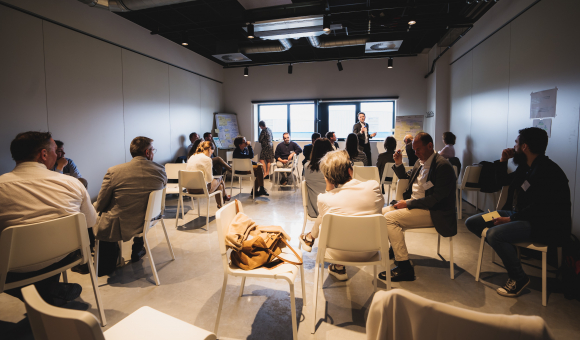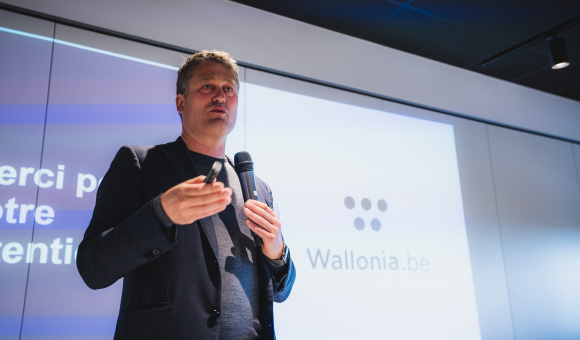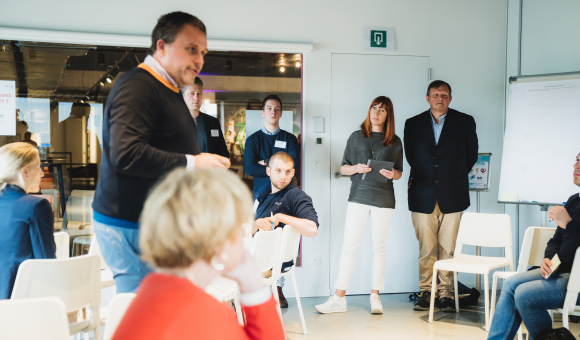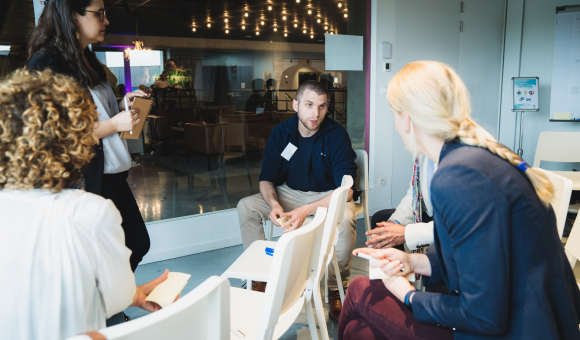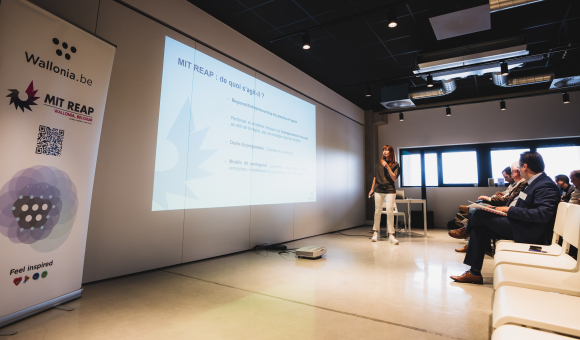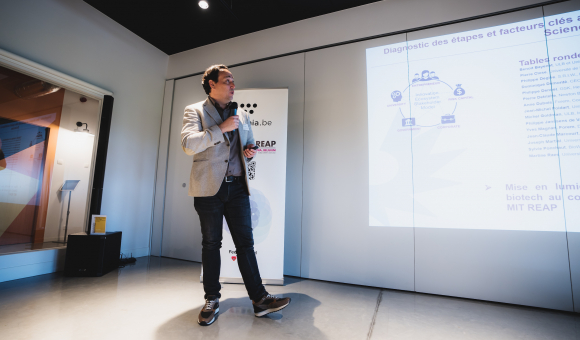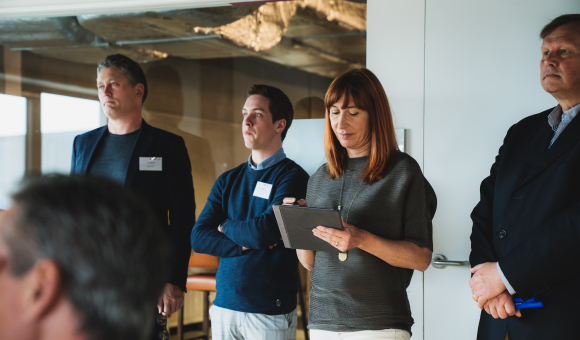
Wallonia's ongoing recovery is driven not only by the dynamism of its residents but also by the continuous improvement of its leaders' skills. These leaders must keep advancing their expertise to offer the best opportunities and make well-informed decisions. In line with this, 12 representatives from the Walloon ecosystem recently completed the MIT REAP (see box) in the USA.
Bridging innovation and entrepreneurship
It all began in early 2020 when Wallonia-Brussels International (WBI) led a mission to Boston. This mission facilitated meetings with numerous economic, technological and scientific partners and strengthened existing links with leading North American programmes that could serve Wallonia's interests. Among the initiatives presented, the MIT Regional Entrepreneurship Acceleration Program (MIT REAP) caught the participants' attention. This two-year programme aims to support strategic actors in building bridges between innovation and entrepreneurship and accelerating the economic and social progress of the participating region through new, innovative strategies. The programme has been running for 10 years and to date 80 regions have taken part.
Five strategic areas
Wallonia was accepted into the 2021-2023 cohort after applying in October 2020. This group of 12 representatives from Wallonia's ecosystem (see box) took part to support the implementation of the region's economic recovery strategy, particularly in the context of reindustrialisation and the post-Covid recovery. "This provides us with enriching opportunities for reflection and exchange. The MIT REAP programme supports the implementation and development of the Walloon Recovery Plan strategy, the policy of competitiveness clusters, as well as extending Wallonia's Smart Specialisation Strategy (S3), the five Strategic Initiative Domains (SID) and the development of the nineteen Strategic Innovation Initiatives (SII)," explains Pascale Delcomminette, Administrator General of WBI and the Wallonia Export-Investment Agency (AWEX) and MIT REAP programme participant.
Three key themes
When Wallonia embarked on this initiative, it was accompanied by other regions including Egypt, Caldas (Colombia), Rio De Janeiro (Brazil), Los Angeles (USA), Northern Ireland (UK) and Eastern Province (Saudi Arabia). The Walloon team, known as "Team Wallonia", included representatives from the five key sectors (pentagram): corporate, risk capital, universities, entrepreneurship and government, in accordance with the MIT REAP methodology. Dominique Demonté, CEO of Charleroi's BioPark, highlighted the challenges: "Today, one of our challenges is to continue to develop while becoming less dependent on the biopharmaceutical and biotech sectors, both of which have seen significant success in recent years (in terms of R&D, investment, jobs, exports...), and to replicate this success in other sectors."
Hydrogen, the circular economy and digital technologies for transition
At every stage, the approach avoided working in silos, as explained by Pascale Delcomminette: "We don't work alone. We consulted with companies and the Walloon ecosystem, including competitiveness clusters, the Walloon Union of Companies (UWE), sector federations (Agoria, Fevia, Essenscia, CCW), Waltech, FOREM, the Walloon Digital Agency (AdN), Wallonie Entreprendre and the Walloon Public Service for Economy, Employment, and Research (SPWEER). With these stakeholders, we discussed workforce shortages, tailored training, process digitalisation, ecosystem strengthening, value chain structuring and reinforcement, regional sub-specialisation; as well as cybersecurity, recycling (reverse metallurgy), strategic sectors, the lack of venture capital funding, the shortage of STEM graduates and improving ties with universities..."
"Team Wallonia" collaborated with key stakeholders, organising a workshop in Wallonia attended by 80 representatives from the Walloon ecosystem, with an MIT professor playing an inspiring and significant role. The workshop focused on cleantech sub-themes, including hydrogen (such as hydrogen production and storage in conjunction with the Port of Antwerp and the von Karman Institute for Fluid Dynamics), the circular economy (reverse metallurgy and mineral metallurgy) and digital technologies for transition. "The long-term ambition is to replicate the success achieved in life sciences (biotech) in Wallonia by extending best practices to the cleantech sector," adds Dominique Demonté. "Today we are recognised as a Biotech Valley; tomorrow we want to be known as a Cleantech Valley."
Tangible actions on the ground
This work has already led to certain actions on the ground, such as the establishment of two cleantech hubs, which have been awarded the MIT REAP label. The Cleantech District in Charleroi has also been strengthened as a local ecosystem and the "Heart for Cleantech" initiative (Cœur de Hainaut) has been launched. Finally, the REMIND project draws on the MIT REAP pentagram model, involving five stakeholders. A climathon event was organised. In addition, AWEX has decided, among other targeted Cleantech initiatives, to finance a joint stand at the World Hydrogen Summit 2024 in Rotterdam. This is being done in collaboration with the other two Belgian regions and the federal government, on the initiative of the "Belgian Hydrogen Council".
Long-term benefits
The MIT REAP project gives Wallonia access to an incredible global network of connections: "We have become 'alumni'. We now have a sustainable relationship with the teams at MIT, particularly those at the MIT Sloan School of Management. We obviously intend to raise awareness among the regional political authorities by sharing a memorandum highlighting the importance of the five key stakeholders in any structuring project, as well as the need to transform Wallonia into a cleantech valley," explains Pascale Delcomminette. She adds that "it is also essential to organise effective governance by setting up a structure for coordinating, steering and monitoring projects (a 'backbone organisation'). This step is crucial in maintaining our momentum, but it takes time. We currently have a transitional structure with the members of 'Team Wallonia' acting as a 'delivery unit' with a limited lifespan to organise and coordinate specific projects while contributing to the definition and structuring of the final organisation. Lastly, we need to build a stronger 'Cleantech Wallonia' image internationally."
There are several upcoming projects, such as a business plan competition dedicated to cleantech through the FR2B programme, a "GreenBooster" call for tenders in partnership with WSL and an international cleantech summit. These will put Wallonia firmly on the cleantech map creating a robust supply of innovative entrepreneurs in these forward-looking sectors.
What does the MIT REAP Methodology involve? Three key points to remember
The MIT REAP methodology is based on the following core principles:
- The need to systematically mobilise the five stakeholders (corporate/risk capital/universities/entrepreneurship/government).
- A constant connection between the elements of strategy, system and stakeholders: every partner plays a key role and must be mobilised in the development of a strategy.
- The importance of a strong link between entrepreneurial capabilities (E-Cap) and innovative capabilities (I-Cap) in sectors where there are comparative advantages, in order to achieve a significant regional impact.
A cross-sectoral team
Wallonia formed a team of twelve representatives, decision-makers and experts from the five pillars of the pentagram ("Team Wallonia"):
- Simon Alexandre, General manager & Partner – The Faktory Fund
- Fabrice Brion, CEO of I-Care
- Pascale Delcomminette, Administrator General WBI and Wallonia Export-Investment Agency
- Dominique Demonté, CEO – BioPark Charleroi
- Sébastien Durieux, Vice President – WE
- Sophie Joris, CEO – La Smala/former Director – VentureLab
- Marc Labie, Professor – First Vice Rector UMons
- Sylvie Marique, Secretary General – SPW
- Amélie Matton, CEO of AMB – Ecosteryl
- Sylvie Ponchaut, Managing Director – BIOWIN
- Marc Van Den Neste, Ecosystem Director – District Cleantech/former Research and Innovation Public Affairs - AGC Glass Europe
- Gérome Vanherf, CEO – La Grand Poste
What changes have been seen on the ground?
The most common strategic interventions deployed within the regions following MIT REAP are, for example, the creation of new public-private partnerships (27%), the creation or reinforcement of Innovation Centres (18%), the setting up of new Training Programmes (16%), the establishment of Acceleration Programmes for companies (12%) and the implementation of new public regulations (11%)
By Vincent Liévin
This article is from Revue W+B no. 164.
